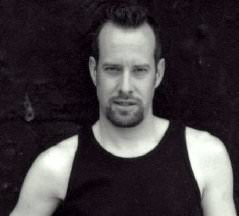Steven Satta Fleming is directing Daniel MacIvor’s heartbreaking and funny The Soldier Dreams at Iron Crow Theatre Company, and Steven Satta Fleming is playing Richard.The play is a poignant glimpse into the final days of a dying man surrounded by his partner and loved ones.
Steven Satta Fleming (Director)
What is The Soldier Dreams about and what drew you to the project?

I did my graduate work in Toronto at York University and there I was introduced to the incredible canon of Canadian dramatic literature (I am an American). Daniel MacIvor is one of my favorite Canadian authors because he is both simple and spare in his writing and yet extravagant in his use of theatricality. The Soldier Dreams is a beautiful and wickedly funny play but it is hard to categorize or describe, so when I tried to get American artists interested in it, I had a real uphill climb. It isn’t a “dark comedy” although it is both “dark” and “comic”. It is the story of a family coming to terms with the impending death of its most beloved member. It has a lot to say about the way we create bonds, the lies we tell ourselves or allow ourselves to believe in order to feel that our relationships are exactly the way we want them to be. As the family confronts the finality of death, they begin to ponder these things and, ultimately, discover what is truly important, which is very rarely what we think is important in our self-absorbed day-to-day world. What sets this play apart and what truly drew me to it is its very Canadian lack of sentimentality. The play is clear-eyed and has a rough, jagged beauty to it – it does not manipulate or deal in cheap, maudlin emotion, although it is full of compassion for its characters.
Two actors are needed to play David, the lead character, one as the “dream” David, derived of his memories, and the reality version who has a terminal illness. How did you choose your leads, and how did you direct these two actors to please these two ‘Davids.’
David is the “favorite son”. His charisma and exuberance are infectious and everyone wants to bask in his glow and feel like they are closest to him. Many characters work hard to convince themselves that “David liked me best”. The interesting thing for me is that I believe that David was aware of this and shouldered it as a kind of responsibility.
We learn over the course of the play, however, that David told a lot of lies – big and small. And yet we come to realize that in the most important ways, he was honest and had a huge heart. He allowed people to believe what they needed to believe to feel close to him; he gave them what they wanted. We also see that some of these lies came out of the stress placed on him by being the hub of a very dysfunctional family. He lied sometimes to give himself “a break from the war,” but maybe that lie was less hurtful than some truths he might have told. Someone once said to me: “honesty is not a license to kill” and I believe that idea is made manifest in David.
In choosing actors, Paul Wissman was a natural for the memory David. He has this warm, likeable energy and yet there is a darkness and depth in him. Choose a purely “happy-go-lucky” actor and you’ve got a glib, slick David, which doesn’t work. Someone too tortured would make us wonder why anyone wanted to spend so much time with him. Paul is the perfect balance – we see how he could be a LOT of fun at a party and also how people would also trust him with their hearts.

The “reality” David is also an important casting choice, although the audience barely sees him and he says about 9 lines in the play. This is the David that the actors playing the family relate to – he is their emotional anchor though the events of the play. The family must love him dearly. Alec Weinberg had worked with the company before and is so warm and loving it is almost unbelievable. Alec has invented what I call ‘projectile hugging’ – he launches himself at you and gives you an embrace so full of energy and love it must be experienced to be believed. This was exactly who we needed in that bed. He is also a very fine actor, although he doesn’t exactly get a chance to show you his range in this particular piece.
Parts of the play have little dialog, how have you approached these scenes and what do you rely on to convey what you want to the audience?
We’ve spent a lot of time discussing what happens when MacIvor writes “pause” or “silence” in the script. Those are moments which are actually MORE full of emotion than the moments which are full of dialogue. So, we have worked to define the tremendous emotional movement happening inside the characters even though externally they are still and quiet. I must say that in these moments a director must rely on the transparency and energetic potency of the actors. There is only so much you can “choreograph” – a stunning stage picture won’t do much if your actors can’t fill it. It is about the heart-space the actors occupy in those moments. I am extremely lucky to have a vibrant cast that can do this.
Many of David’s family members have a monologue describing their relationship with him. How does this help tell his story?
These monologues are all “meta-moments” – moments when the characters step out and directly address the audience in real time. MacIvor plays with ‘meta-theatrics” a lot and I find these moments very potent. You learn a lot about a character when they are alone with the audience. In this play mostly you learn what they aren’t saying to the other characters. After a few of these monologues, you begin to see the patterns and the contradictions, and the context of the play begins to shift dramatically both forward and backward. This knowledge colors the rest of the play, and gives you a lens through which to reflect on the events you have already seen. Your memory of a moment differs from your experience of the moment, which is a big theme in the play.
What is background in directing?
I began as an actor and I am still an actor. The first thing I ever directed was an adaptation of Shakespeare’s Venus and Adonis for a company which did stagings of literary pieces in the NYC Public Library system back in the early 90s. I had acted in a few things with this company and thought I would try adapting a piece. I was shocked when the head of the company told me he wanted me to direct it. I did and it was successful. Along the way I learned that I really enjoyed the collaborating with the actors in this way – I loved the give-and-take in rehearsal. Other opportunities quickly presented themselves but I was cautious, as I didn’t want to stop acting. I love doing both, and it’s great to be in Baltimore, where folks regularly do both. In NY you really need to choose, as it is a city of ‘specialists’ and if you aren’t really focused on ONE thing, you won’t get anywhere. In Baltimore, there is room to breathe and grow and try different things.
How would you describe your style of directing?
I am drawn to plays with heightened language and poetic content. On the other hand I love things that are really spare and lean and simple. I’m very influenced by Charles Ludlam’s Theatre of the Ridiculous and Tony Kushner’s Theatre of the Fabulous. Both of these artists really exploit the theatrical and aren’t afraid to be extravagant in some way, either physically or emotionally. I love artifice and style, and I love telling big fat lies on stage – things that can’t possibly ever happen in the real world – which reveal essential truths. I have a dear friend who is a costumer who always says: “if it’s worth doing, it’s worth OVERdoing!” I love that kind of courage in the theatre, although I don’t always work in an extravagant style in terms of sets, lights, etc.
Do you think this story has a lesson for its audience, and if so, what is it?
Don’t waste time. Forgive. Don’t judge. Never pass up an opportunity to dance. Call your family.
______________________
Joseph Ritsch (Richard in The Soldier Dreams)
Where did you get your theatre training?

I have a BA in theatre and dance and an MFA in theatre. I also attended and completed the Professional Theatre School Program at Playwrights Horizons in NYC in the acting track. After my training at Playwrights Horizons I spent a number of years working with Jane Comfort and Company, one of the movement theatre worlds most acclaimed ensembles. With Jane and the company I toured both the US and to Europe. I also did some professional acting work in both NYC and Philly with smaller ensemble companies
How did you become a member of Iron Crow?
I am a founding member of Iron Crow and free lance direct and choreograph, which has been more of my focus the past few years, but I do still do some acting as well. I was asked by Steve Satta to be a founding member of Iron Crow Theatre after getting to know my work while getting my MFA at Towson University. My play Apartment 213, which was written as my thesis project, was co-produced by Iron Crow Theatre last fall and was chosen by Baltimore City Paper as one of the “top 10” performances of the Baltimore professional theatre season. The play is an exploration of the Jeffrey Dahmer murders, using text, dance, sound and video to explore the social and psychological world of the serial killer.
Tell us about your character in The Soldier Dreams?
I play Richard, David’s lover who is dealing with David’s death and the invasion of their home by David’s family as he (David) nears the end of his life.
Have you called on any personal experiences to prepare for your role?
Loss is loss and we have all experienced it. Loss is part of the human condition. As actors we shape our personal experience to fit the emotion of the play. And although Richard’s specific situation and experience is not similar to my own, I certainly can identify and bring my own heart to the production.
This play portrays a wide range of emotions. Which scenes are more difficult in your opinion? Is comedy or tragedy your preference?
I really don’t have a preference. For me the humor in this very sad play comes out of the pain. I don’t have scenes that I find more difficult than others. The challenge as an actor is coloring the performance in a way that explores the levels of emotion a person dealing with loss goes through. The writing in the play is so beautifully simple that it forces the performances to be painfully complex. As an actor in the world of this play, every choice is magnified. There is nothing to hide behind in the text. As an actor in this play I must trust the text, speak its simple truths while simultaneously creating a vast emotional journey underneath
Why is this play important?
This play is important because of the way it looks at love and loss in a very raw and real way. It looks at what is important in our lives and how fleeting those things can be, especially in regard to relationships and the loved ones in our life.
What are other favorite roles you’ve played?
For me, each play I work on either as an actor or as a director is my favorite in the moment. I try to be involved with work that I find important and that I am truly passionate about. I am truly grateful to have had such a great experience with the artistic work that has come into my life.
The Soldier Dreams plays from runs April 7 through the 21, 2012, at Iron Crow Theatre Company – 45 West Preston Street, in Baltimore, MD. Purchase tickets online.




